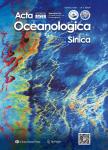Comparison and combination of EAKF and SIR-PF in the Bayesian filter framework
Comparison and combination of EAKF and SIR-PF in the Bayesian filter framework作者机构:State Key Laboratory of Satellite Ocean Environment Dynamics Second Institute of OceanographyState Oceanic Administration Environmental Science and Engineering University of Northern British Columbia
出 版 物:《Acta Oceanologica Sinica》 (海洋学报(英文版))
年 卷 期:2016年第35卷第3期
页 面:69-78页
核心收录:
学科分类:08[工学] 0816[工学-测绘科学与技术]
基 金:The National Natural Science Foundation of China under contract Nos 41276029 and 41321004 the Project of State Key Laboratory of Satellite Ocean Environment Dynamics,Second Institute of Oceanography under contract No.SOEDZZ1404 the National Basic Research Program(973 Program)of China under contract No.2013CB430302
主 题:data assimilation ensemble adjustment Kalman filter particle filter Bayesian estimation ensemble adjustment Kalman particle filter
摘 要:Bayesian estimation theory provides a general approach for the state estimate of linear or nonlinear and Gaussian or non-Gaussian systems. In this study, we first explore two Bayesian-based methods: ensemble adjustment Kalman filter(EAKF) and sequential importance resampling particle filter(SIR-PF), using a well-known nonlinear and non-Gaussian model(Lorenz '63 model). The EAKF, which is a deterministic scheme of the ensemble Kalman filter(En KF), performs better than the classical(stochastic) En KF in a general framework. Comparison between the SIR-PF and the EAKF reveals that the former outperforms the latter if ensemble size is so large that can avoid the filter degeneracy, and vice versa. The impact of the probability density functions and effective ensemble sizes on assimilation performances are also explored. On the basis of comparisons between the SIR-PF and the EAKF, a mixture filter, called ensemble adjustment Kalman particle filter(EAKPF), is proposed to combine their both merits. Similar to the ensemble Kalman particle filter, which combines the stochastic En KF and SIR-PF analysis schemes with a tuning parameter, the new mixture filter essentially provides a continuous interpolation between the EAKF and SIR-PF. The same Lorenz '63 model is used as a testbed, showing that the EAKPF is able to overcome filter degeneracy while maintaining the non-Gaussian nature, and performs better than the EAKF given limited ensemble size.



